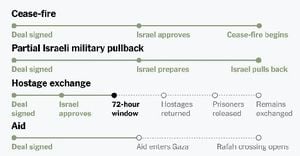In a week marked by major developments in the critical minerals sector, two regions thousands of miles apart—California’s Mojave Desert and the mineral-rich expanses of Alaska—have found themselves at the center of a new American resource strategy. With China tightening its grip on the global supply of essential minerals, U.S. companies and policymakers are ramping up efforts to secure domestic alternatives, aiming to safeguard both economic interests and national security.
Locksley Resources Ltd., an Australia-based mining company listed on the ASX and OTC markets, announced a significant expansion of its exploration program in the Mojave Desert. Earlier this month, Locksley acquired an additional 249 claims adjacent to land controlled by MP Materials, the operator of the only rare earths producing mine in North America. This acquisition brings Locksley’s total landholding to 491 claims, covering more than 40 square kilometers of what the company describes as “highly prospective critical minerals.”
“The substantial expansion of our landholding within the Mojave Critical Minerals Corner marks a pivotal step in Locksley's growth,” said Pat Burke, Chairman of Locksley Resources, in a statement distributed by InvestingNews.com. Burke emphasized the strategic importance of the site, which now sits alongside a proven rare earths asset. Last week, brokers and analysts visited the Mojave site, providing Locksley with an opportunity to showcase both the scale of its tenure and the potential of its holdings.
This move comes at a time when the United States is grappling with a shifting global landscape for critical minerals—those essential to everything from electric vehicles and smartphones to advanced military technologies. China, which dominates the processing and export of minerals like gallium, germanium, antimony, and graphite, has recently imposed new export restrictions. According to CityBuzz.co, these restrictions have created an urgent demand for domestic alternatives, transforming resource development from a primarily economic issue into a matter of national security.
The impact of these global shifts was underscored by a historic visit from the U.S. House Committee on Natural Resources to Alaska on September 15, 2025. The bipartisan delegation recognized Alaska’s strategic mineral potential—an acknowledgment that signals a significant pivot in federal attitudes toward domestic mining. Traditionally viewed through the lens of oil and gas, Alaska is now emerging as a critical hub for minerals that support defense systems, renewable energy technologies, and advanced manufacturing.
“The convergence of congressional attention, Pentagon interest, and global supply chain vulnerabilities creates unprecedented opportunities for mineral development in stable jurisdictions like Alaska,” noted a report from InvestorBrandNetwork, published on RocksAndStocks.news. The Pentagon’s interest in Alaskan antimony projects is particularly telling, as it reflects how geopolitical tensions are reshaping federal support for domestic mineral development. Senator Lisa Murkowski’s advocacy for increased U.S. production of critical minerals dovetails with the ambitions of companies like Trilogy Metals Inc., whose Upper Kobuk Mineral Projects contain copper, zinc, cobalt, and other materials deemed essential for national security.
China’s dominance in mineral processing and its recent export restrictions have forced the United States to reconsider its supply chain vulnerabilities. The push for domestic production is not just about economics; it’s about ensuring that the country can maintain its technological and military edge in an increasingly competitive and uncertain world. The minerals in question power everything from electric vehicles and renewable energy storage systems to advanced weaponry and aerospace technologies. As the CityBuzz.co article explains, “This strategic pivot reflects broader concerns about supply chain security and the need for reliable domestic sources of materials that power everything from electric vehicles to military equipment.”
Locksley Resources’ expansion in the Mojave Desert is emblematic of the broader race to secure critical mineral supplies. The company’s new claims abut those of MP Materials, which operates the Mountain Pass mine—the only rare earths mine currently active in North America. Rare earth elements, though not as widely recognized as gold or oil, are crucial for the production of high-performance magnets, batteries, and electronic components. The Mojave region, already recognized for its mineral wealth, is now the focus of intensified exploration and investment.
During last week’s site visit, brokers and analysts were given a firsthand look at the vastness and potential of Locksley’s expanded landholding. According to the company, this visit was an excellent opportunity to highlight both the scale of the tenure and the strategic importance of its position in the region. The timing couldn’t be more relevant, as U.S. policymakers and industry leaders are increasingly aware of the need to develop reliable, domestic sources of critical minerals.
Meanwhile, Alaska’s mineral sector is experiencing a renaissance of its own. The state’s vast deposits of copper, zinc, cobalt, and antimony are drawing attention from both government and industry. The Upper Kobuk Mineral Projects, operated by Trilogy Metals, are seen as especially promising. Senator Murkowski’s push for domestic critical mineral production is not just about economic development—it’s about ensuring that the United States has the materials it needs to remain competitive on the global stage.
The Pentagon’s interest in Alaska’s antimony resources is particularly noteworthy. Antimony is used in a variety of defense applications, including flame retardants, ammunition, and certain types of batteries. With China controlling a significant portion of the world’s antimony supply, the U.S. Department of Defense is keen to identify and develop alternative sources within friendly jurisdictions.
All of these developments are taking place against a backdrop of heightened geopolitical tension and growing concern over supply chain security. The United States, once content to rely on global markets for its mineral needs, is now taking concrete steps to reduce its dependence on foreign suppliers—especially those in rival nations. The shift is not just about economics or even environmental policy; it is about national resilience and the ability to withstand external shocks.
As the competition for critical minerals intensifies, companies like Locksley Resources and Trilogy Metals find themselves at the forefront of a new era in American resource development. Their efforts, supported by both market forces and government policy, could help ensure that the United States maintains its technological and military edge in the decades to come.
In a world where the control of minerals increasingly shapes the balance of power, the deserts of California and the wilds of Alaska have become unlikely battlegrounds for America’s future security and prosperity.



